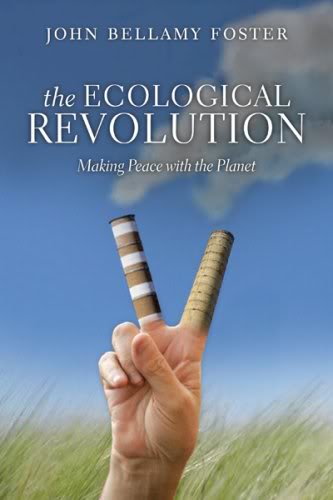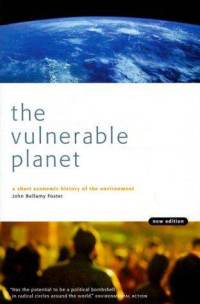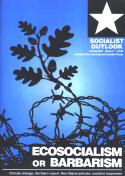Ecological Revolution for Our Time
by Simon Butler
 Karl Marx and Frederick Engels famously urged the world's workers to unite because they had a world to win, and nothing to lose but their chains. Today, the reality of climate change and worsening environmental breakdowns globally adds a further vital dimension to this vision of human liberation. We still have a world to win -- but we also have a world to lose. Karl Marx and Frederick Engels famously urged the world's workers to unite because they had a world to win, and nothing to lose but their chains. Today, the reality of climate change and worsening environmental breakdowns globally adds a further vital dimension to this vision of human liberation. We still have a world to win -- but we also have a world to lose.
The ecological crisis is not simply the result of poor planning or bad decisions. Nor is it an unforeseeable accident. It's the inevitable outcome of an unjust economic and social system that puts business profits before all else -- even as it undermines the natural basis of life itself.
With his previous books, such as Marx's Ecology and The Vulnerable Planet, and as the editor of the US-based Marxist journal Monthly Review, John Bellamy Foster has established a well-earned reputation as one of the world's most persuasive voices arguing for fundamental social change to tackle the looming ecological catastrophe.
His new book, The Ecological Revolution, could not have been published at a more timely moment. It argues a solution to the ecological crisis "is now either revolutionary or it is false."
 Foster draws on the warnings from leading environmentalists such as Bill McKibben, James Hansen, and Lester Brown among others. Foster draws on the warnings from leading environmentalists such as Bill McKibben, James Hansen, and Lester Brown among others.
McKibben has said we have now entered the "Oh Shit" era of global warming -- it's already too late to stop the harsh impacts of climate change entirely. NASA scientist Hansen has said the rapid pace of climate change amounts to a "planetary emergency."
In his 2008 book Plan B 3.0, Brown said: "We are crossing natural thresholds that we cannot see and violating deadlines that we do not recognize. Nature is the time keeper, but we cannot see the clock. . . . We are in a race between tipping points in the earth's natural systems and those in the world's political systems. Which will tip first?"
The Ecological Revolution is a call for urgent action and an intervention into the debates about the kind of action needed to win this "race."
The dwindling band of climate change deniers aside, general awareness of the extent of environmental decay is more widespread than ever -- even among the world's elites. The upshot is that two distinct visions of ecological revolution have emerged.
The first tries to paint business as usual economics green. The second, following Che Guevara's maxim, holds it must be a genuine eco-social revolution or it's a make-believe revolution.
"The conflict between these two opposing approaches to ecological revolution," writes Foster, "can now be considered the central problem facing environmental social science today."
Read more...
John Bellamy Foster on `Marx's Ecology' and `The Ecological Revolution'
John Bellamy Foster interviewed by Aleix Bombila
 John Bellamy Foster is editor of the US socialist journal Monthly Review and author of Marx's Ecology and The Ecological Revolution. Aleix Bombila writes for En Lucha (Spain). This interview first appeared in English at MRZine. John Bellamy Foster is editor of the US socialist journal Monthly Review and author of Marx's Ecology and The Ecological Revolution. Aleix Bombila writes for En Lucha (Spain). This interview first appeared in English at MRZine.
En Lucha: In your book Marx's Ecology you argue that Marxism has a lot to offer to the ecologist movement. What kind of united work can be established between Marxists and ecologists?
John Bellamy Foster: I think it is important to recognise that Marxists and ecologists are not entirely different groups. Of course it is true that there have been Reds who have been anti-ecological and Greens who have been anti-Marxist. But it is not uncommon for the two to overlap, and increasingly to converge. Many socialists are environmentalists and many environmentalists are socialists. Indeed, there is a sense in which Marxism and ecology, both classically and today, lead to the same conclusion. For Marx, the goal was the creation of a society in which the metabolic relation between humanity and nature (i.e. production) was rationally regulated by the associated producers. The original title of my book that you refer to was supposed to be Marx and Ecology, but I changed it to Marx's Ecology because of the depth of Marx's ecological conceptions.
I would argue that a critical Marxist approach, especially in our time, requires an ecological worldview, while a critical human ecology requires an anti-capitalist and ultimately socialist orientation (i.e., a Marxist one). In terms of united work that Marxists and ecologists can share, I would say social justice and environmental sustainability: saving humanity and saving the Earth. You can't expect to achieve one without the other, and neither is possible under the existing system.
Read more...
Eco-Socialism
Why we need Eco-socialism
Derek Wall
In his presentation to the Socialist Resistance ‘Ecosocialism or Barbarism’ day school Dr. Derek Wall, the Male Principal Speaker of the Green Party of England and Wales argued for a re-reading of Marx to develop ecosocialist principles, for the alternative is literally unthinkable destruction. Derek Wall is a life long ecosocialist and founder of the GPEW socialist group Green Left. [1]
I would like to thank you for endorsing Joel Kovel and Michael Lowy’s Ecosocialist Manifesto: [2] it is an essential document because it argues that unlimited economic growth is unsustainable, while capitalism to survive must grow for ever. It calls for an alternative to this system of madness. Support for the Ecosocialist manifesto is therefore vital.
In a passage from Capital: Volume One, which is important for its understanding of how we can create a sustainable future, Marx links the open source principle to socialism and use - we should take what we want but nurture what we use for the benefit of the next generation:
From the standpoint of a higher economic form of society, private ownership of the globe by single individuals will appear quite absurd as private ownership of one man by another. Even a whole society, a nation, or even all simultaneously existing societies taken together, are not the owners of the globe. They are only its possessors, its usufructuries, and like boni patres familias, they must hand it down to succeeding generations in an improved condition. [3]
Read more...
 Eco-socialism, green socialism or socialist ecology is an ideology merging aspects of Marxism, socialism, green politics, ecology and alter-globalization. Eco-socialists generally believe that the expansion of the capitalist system is the cause of social exclusion, poverty, war and environmental degradation through globalization and imperialism, under the supervision of repressive states and transnational structures.[1] Eco-socialism, green socialism or socialist ecology is an ideology merging aspects of Marxism, socialism, green politics, ecology and alter-globalization. Eco-socialists generally believe that the expansion of the capitalist system is the cause of social exclusion, poverty, war and environmental degradation through globalization and imperialism, under the supervision of repressive states and transnational structures.[1]
Eco-socialists advocate the dismantling of capitalism and the state, focusing on collective ownership of the means of production by freely associated producers and restoration of the commons.[1]
|
Contents
- 1 Ideology
- 2 History
- 2.1 1880s-1930s - Marx, Morris and influence on the Russian Revolution
- 2.2 1970s-1990s - Rise of environmentalism and engagement with Marxism and 'actually existing socialism'
- 2.3 1990s onwards - Engagement with the anti-globalization movement and The Ecosocialist Manifesto
- 2.4 Influence on current Green and socialist movements
- 2.5 Influence on “existing socialist” regimes
- 2.6 Ecosocialist International Network (EIN) and other international eco-socialist organisations
- 3 Critique of capitalist expansion and globalisation
- 3.1 Use and exchange value
- 3.2 The "second contradiction" of capitalism
- 3.3 The role of the state and transstatal organisations
- 4 Tensions within the Eco-Socialist discourse
- 5 Critique of other forms of green politics
- 5.1 Opposition to within-system approaches, voluntarism and technological fixes
- 5.2 Critique of Green economics
- 5.3 Critique of Deep Ecology
- 5.4 Critique of bioregionalism
- 5.5 Critique of variants of eco-feminism
- 5.6 Critique of Social Ecology
- 5.7 Opposition to Malthusianism and Neo-Malthusianism
- 5.8 The "two varieties of environmentalism"
- 6 Critique of other forms of socialism
- 6.1 Critique of 'Actually Existing Socialisms'
- 6.2 Critique of the wider socialist movement
- 7 Eco-socialist strategy
- 7.1 Agency
- 7.2 Prefiguration
- 7.3 Internationalization of prefiguration and the 'Eco-socialist Party'
- 8 ’The Revolution’ and transition to eco-socialism
- 8.1 The immediate aftermath of the revolution
- 8.2 Transnational trade and capital reform
- 8.3 Ecological production
- 8.4 Commons, property and ‘usufruct’
- 8.5 Non-violence
- 9 Criticisms of eco-socialism
- 10 List of eco-socialists
- 11 See also
- 12 References
- 13 External links
|
Ideology
Eco-socialists are critical of many past and existing forms of both Green politics and socialism. They are often described as Red Greens - adherents to Green politics with clear anti-capitalist views, often inspired by Marxism (Red Greens should be contrasted with Blue Greens).
The term Watermelon is commonly applied, often as an insult, to describe professed Greens who seem to put "social justice" goals above ecological ones, implying they are "green on the outside but red on the inside"; the term is usually attributed to either Petr Beckmann or, more frequently, Warren T. Brookes,[2][3][4] both critics of environmentalism, and is apparently common in Australia,[5][6] New Zealand[7] and the United States[8]
A website in New Zealand, The Watermelon, uses the term as a compliment, stating that it is "green on the outside and liberal on the inside", using the term 'liberal' while also citing "socialist political leanings", reflecting the use of the term 'liberal' to describe the left-wing in many English-speaking countries.[7] Red Greens are often considered 'fundies' or 'fundamentalist greens', a term usually associated with Deep Ecology despite the fact that the German Green Party 'fundi' faction included eco-socialists, and eco-socialists in other Green Parties, like Derek Wall, have been described in the press as 'fundies'.[9][10]
Eco-socialists also criticise bureaucratic and elite theories of socialism such as Maoism, Stalinism and what other critics have termed Bureaucratic Collectivism or State Capitalism. Instead, eco-socialists focus on imbuing socialism with ecology while keeping the emancipatory goals of 'first-epoch' socialism.[1] Eco-socialists aim for a world of communal ownership of the means of production by "freely associated producers" with all forms of domination eclipsed, especially gender inequality and racism.[1]
This often includes the restoration of commons land in opposition to private property,[11] in which local control of resources valorizes the Marxist concept of use value above exchange value.[12] Practically, eco-socialists have developed different theories of ways to mobilise action on an internationalist basis, developing networks of grassroots individuals and groups that can radically transform society through non-violent "prefigurative projects" for a post-capitalist, post-statist world.[12]
History
1880s-1930s - Marx, Morris and influence on the Russian Revolution
Contrary to the depiction of Karl Marx by some environmentalists,[13] social ecologists[14] and fellow socialists[15] as a productivist who favoured the domination of nature, eco-socialists have revisited Marx's writings and believe that he "was a main originator of the ecological world-view".[12] Eco-socialist authors, like John Bellamy Foster[16] and Paul Burkett,[17] point to Marx's discussion of a "metabolic rift" between man and nature, his statement that "private ownership of the globe by single individuals will appear quite absurd as private ownership of one man by another" and his observation that a society must "hand it [the planet] down to succeeding generations in an improved condition".[18] Nonetheless, other eco-socialists feel that Marx overlooked a "recognition of nature in and for itself", ignoring its "receptivity" and treating nature as "subjected to labor from the start" in an "entirely active relationship".[12]
Therefore William Morris, the English novelist, poet and designer, is largely credited with developing key principles of what was later called eco-socialism.[19] During the 1880s and 1890s, Morris promoted his eco-socialist ideas within the Social Democratic Federation and Socialist League.[20]
Following the Russian Revolution, some environmentalists and environmental scientists attempted to integrate ecological consciousness into Bolshevism, although many such people were later purged by the Communist Party of the Soviet Union.[21] The "pre-revolutionary environmental movement", encouraged by revolutionary scientist Aleksandr Bogdanov and the Proletkul't organisation, made efforts to "integrate production with natural laws and limits" in the first decade of Soviet rule, before Joseph Stalin attacked ecologists and the science of ecology and the Soviet Union fell into the pseudo-science of the state biologist Trofim Lysenko, who "set about to rearrange the Russian map" in ignorance of environmental limits.[12]
Read more...
Political ecology is the study of the relationships between political, economic and social factors with environmental issues and changes. Political ecology differs from apolitical ecological studies by politicizing environmental issues and phenomena.
The academic discipline offers wide-ranging studies integrating ecological social sciences with political economy (Peet and Watts 1996, p. 6) in topics such as degradation and marginalization, environmental conflict, conservation and control, and environmental identities and social movements (Robbins, 2004, p. 14).
Origins
The term "political ecology" was first coined by Frank Thone in an article published in 1935 (Nature Rambling: We Fight for Grass, The Science Newsletter 27, 717, Jan. 5: 14). it has been widely used since then in the context of human geography and human ecology, but with no real systematic definition. Anthropologist Eric R. Wolf gave it a second life in 1972 in an article entitled “Ownership and Political Ecology,” in which he discusses how local rules of ownership and inheritance “mediate between the pressures emanating from the larger society and the exigencies of the local ecosystem” (Wolf 1972, p. 202). Other origins include other early works of Eric R. Wolf as well as John W. Cole and Hans Magnus Enzensberger and others in the 1970s and 1980s.
The origins of the field in the 1970s and 1980s were a result of the development of radical development geography and cultural ecology (Bryant 1998, p. 80). Historically, political ecology has focused on phenomena in and affecting the developing world; since the field’s inception, “research has sought primarily to understand the political dynamics surrounding material and discursive struggles over the environment in the third world” (Bryant 1998, p. 89).
Scholars in political ecology are drawn from a variety of academic disciplines, including geography, anthropology, development studies, political science, sociology, forestry, and environmental history. Some modern prominent scholars include:
Read more...
|
|
 Karl Marx and Frederick Engels famously urged the world's workers to unite because they had a world to win, and nothing to lose but their chains. Today, the reality of climate change and worsening environmental breakdowns globally adds a further vital dimension to this vision of human liberation. We still have a world to win -- but we also have a world to lose.
Karl Marx and Frederick Engels famously urged the world's workers to unite because they had a world to win, and nothing to lose but their chains. Today, the reality of climate change and worsening environmental breakdowns globally adds a further vital dimension to this vision of human liberation. We still have a world to win -- but we also have a world to lose. Foster draws on the warnings from leading environmentalists such as Bill McKibben, James Hansen, and Lester Brown among others.
Foster draws on the warnings from leading environmentalists such as Bill McKibben, James Hansen, and Lester Brown among others.


 Political Ecology
Political Ecology


 Eco-socialism, green socialism or socialist ecology is an
Eco-socialism, green socialism or socialist ecology is an 

